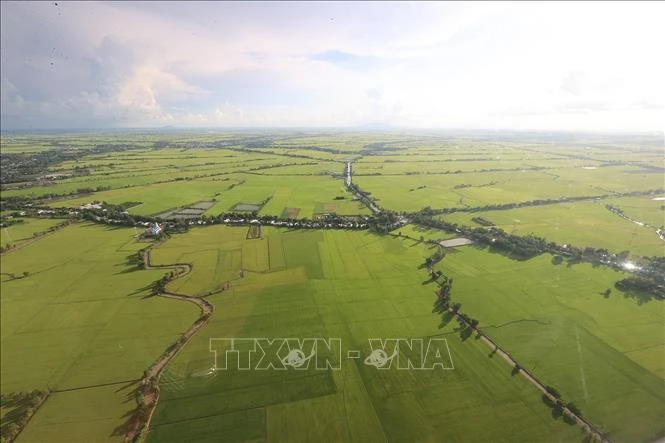Mekong Delta regional masterplan contributes to ensuring food security
The implementation of the Mekong Delta regional masterplan for 2021 – 2030, with a vision towards 2050, has helped shift the mindset about food security from developing agriculture based primarily on rice to a model of aquaculture - fruit - rice to increase value and improve production efficiency, Deputy Minister of Planning and Investment Tran Duy Dong has said.

The implementation of the Mekong Delta regional masterplan for 2021 – 2030, with a vision towards 2050, has helped shift the mindset about food security from developing agriculture based primarily on rice to a model of aquaculture - fruit - rice to increase value and improve production efficiency, Deputy Minister of Planning and Investment Tran Duy Dong has said.
Addressing a recent meeting of the coordinating council for the Mekong Delta region in Ca Mau, the official said over the past two years of implementing the plan, ministries and sectors have proactively coordinated with relevant localities to take solutions appropriate to each period to fully tap new opportunities, aiming to achieve the best results in socio-economic development in general and the development of specific sectors in particular, thus opening up new opportunities and shaping new values throughout the region.
As the standing committee of the coordinating council for the Mekong Delta region, the Ministry of Planning and Investment has chaired and coordinated with relevant ministries and agencies, based on proposals from regional localities, to review mechanisms and policies applied for the region.
Accordingly, localities in the region are permitted to flexibly convert areas of low-efficiency rice cultivation land to grow other crops and fruits. Rice growers will receive special incentives to stabilise the country's major food production areas, and develop a sustainable agriculture sector in harmony with nature.
Deputy Minister Dong instructed the Ministry of Planning and Investment to propose policies tailored for the region regarding clean water supply for local residents, support for areas with clean water shortage, and mechanism conducive for research and investment in large-scale reservoirs.
He also underlined the need for special mechanisms and policies to lure and train high-quality human resources; and attract investment to address issues such as riverbank and coastal erosion, mitigate the impacts of climate change, protect and develop forests, and ensure the welfare of people in coastal areas.
Under the drastic direction of the Government and the Prime Minister, ministries and localities in the region have issued action plans and coordinated closely to implement proposed tasks and solutions decisively, he said.
As a result, regional socio-economic development has gradually stabilised in a more sustainable direction. The Mekong Delta region has established itself as a leading centre for the production and export of rice, aquaculture products, and fruits in the country, contributing to ensuring the national food security.
Last year, the region's economic growth hit 6.37%, the second highest rate among the six regions nationwide, nearly 1.3 times higher than the national average. The per capita DRDP increased 10.1% compared to 2022, reaching 72.32 million VND (2,851 USD).
The regional economic structure continues to shift positively, with a decreasing proportion of agriculture, forestry, and fisheries; an increasing trend in industry and construction; and a slight increase in the service sector. In 2023, the ratios of the three sectors were 30.05%, 27.62%, and 37.07%, respectively./.








